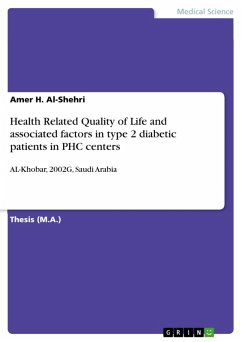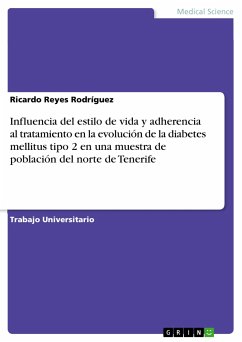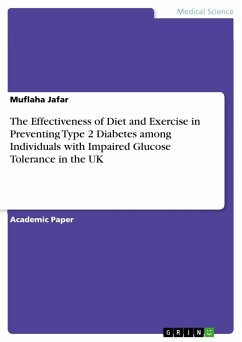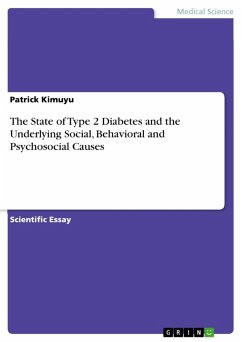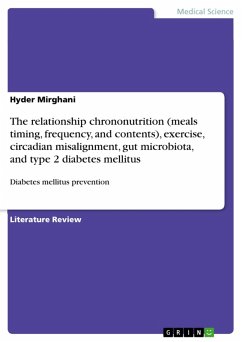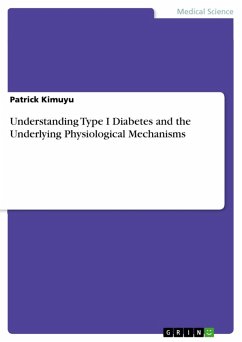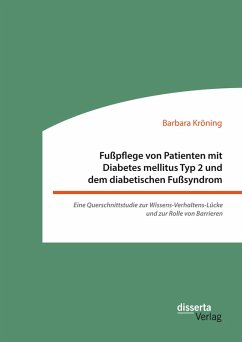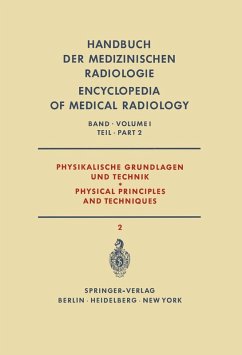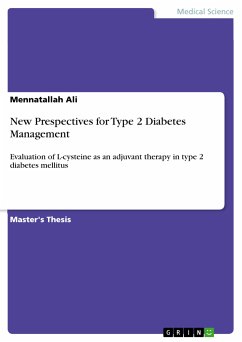
New Prespectives for Type 2 Diabetes Management (eBook, PDF)
Evaluation of L-cysteine as an adjuvant therapy in type 2 diabetes mellitus
Versandkostenfrei!
Sofort per Download lieferbar
39,99 €
inkl. MwSt.
Weitere Ausgaben:

PAYBACK Punkte
0 °P sammeln!
Master's Thesis from the year 2012 in the subject Medicine - Therapy, grade: A, University of Alexandria (Medical Research Institute - Alexandria University), language: English, abstract: Increasing evidence has established causative links between obesity, chronic inflammation and insulin resistance; the core pathophysiological feature in type 2 diabetes mellitus. This study was designed to examine whether the combination of L-cysteine and metformin would provide additional benefits in reducing oxidative stress, inflammation and insulin resistance in streptozotocin-induced type 2 diabetes in r...
Master's Thesis from the year 2012 in the subject Medicine - Therapy, grade: A, University of Alexandria (Medical Research Institute - Alexandria University), language: English, abstract: Increasing evidence has established causative links between obesity, chronic inflammation and insulin resistance; the core pathophysiological feature in type 2 diabetes mellitus. This study was designed to examine whether the combination of L-cysteine and metformin would provide additional benefits in reducing oxidative stress, inflammation and insulin resistance in streptozotocin-induced type 2 diabetes in rats. Male Wistar rats were fed a high-fat diet (HFD) for 8 weeks to induce insulin resistance, after which they were rendered diabetic with low-dose streptozotocin. Diabetic rats were treated with metformin (300 mg/kg/day), L-cysteine (300 mg/kg/day) and their combination along with HFD for another 2 weeks. Control rats were fed normal rat chow throughout the experiment. At the end of treatment, fasting blood glucose, fasting serum insulin, homeostasis model assessment-insulin resistance index (HOMA-IR) and serum free fatty acids (FFAs) were measured. Serum levels of the inflammatory markers; monocyte chemoattractant protein-1 (MCP-1), C-reactive protein (CRP) and nitrite/nitrate were also determined. The liver was isolated and used for determination of malondialdehyde (MDA), reduced glutathione (GSH), caspase-3 and cytochrome c levels. The hypoglycemic effect of the combination therapy exceeded that of metformin and L-cysteine monotherapies with more improvement in insulin resistance. All treated groups exhibited significant reductions in serum FFAs, oxidative stress and inflammatory parameters, caspase-3 and cytochrome c levels compared to untreated diabetic rats with the highest improvement observed in the combination group. In conclusion, the present results clearly suggest that L-cysteine can be strongly considered as an adjunct to metformin in management of type 2 diabetes.
Dieser Download kann aus rechtlichen Gründen nur mit Rechnungsadresse in A, B, BG, CY, CZ, D, DK, EW, E, FIN, F, GR, HR, H, IRL, I, LT, L, LR, M, NL, PL, P, R, S, SLO, SK ausgeliefert werden.




